Having written about being wowed by youth leader Joey Lowenstein (HuffPo), a teen living with and conquering autism, and preparing to award him the 2014 Luce Leadership Award from our foundation, after writing about the David Lynch Foundation several times, and after getting to know and write about broadcaster Rita Cosby, I could not resist the recent webinar in Washington, D.C. that combined all three. The goal: highlighting the enormous hope that exists to improve the lives of those living with autism until the cure is discovered.
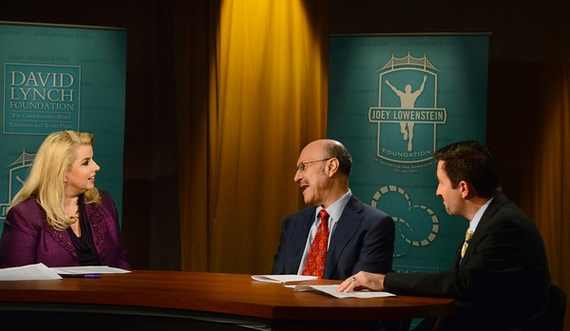
Moderator Rita Cosby with Norman Rosenthal, M.D. and David Black, M.D.
Photo: Neshan Naitchayan.
As my friend stress expert Lorraine Cancro, M.S.W. writes in The Stewardship Report :
I asked moderator Rita Cosby to explain to our readers why dealing with autism is so important. She told me:
In Washington, representatives of the David Lynch Foundation, the Joey Lowenstein Foundation, and the Center for Assessment and Treatment for Autism (CAAT) discussed the effects of a simple, evidence-based meditation technique that has grown since the 1960's: Transcendental Meditation - TM. Fast forward to the 2010's and TM is now practiced by more than five million people worldwide. And now, people with autism and their family members are vouching that it is capable of improving the symptoms in the treatment of Autism Spectrum Disorder.
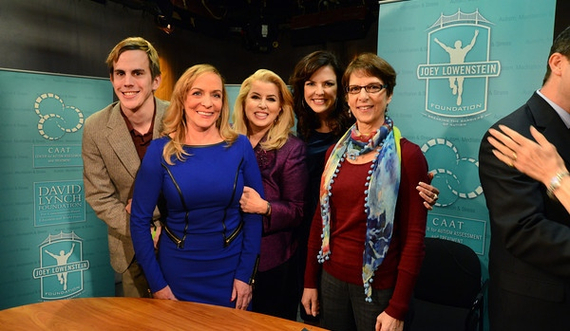
Jaxson Zimmerman, Roberta Lowenstein, Rita Cosby, Lorraine Cancro, M.S.W.,
and Sarina Grosswald, Ed.D. Photo: Neshan Naitchayan.
Lorraine explained, "People with ASDs frequently struggle with transition and changes in routine, and find social interactions stressful. Friendships tend to be challenging. Individuals with ASD commonly struggle to perceive social cues, interpret the social intentions of others, recognize the impact of their own actions in social situations, and respond in socially conventional ways. Reducing stress and anxiety has the potential to significantly improve the quality of life of people with ASDs and their families. However, current treatment for anxiety and stress is very limited."
Transcendental Meditation, they explained in Washington, is a simple, effortless technique practiced for just 15 to 20 minutes twice a day. It is, of course, practiced by sitting comfortably with ones eyes closed. As David Lynch Foundation director Bob Roth explained, "people of all ages and backgrounds -- including those with ASD -- are able to learn and practice TM. Having talked with Buddhists in Indonesia, Sri Lanka, India, Europe and North America, this resonates with everything I have learned.
The reasons for this seem obvious even to a non-meditating non-physician. During TM sessions, the individual experiences a unique state of deep rest and heightened alertness, which reduces stress and promotes more coherent brain functioning. TM as an option is important because there are so few options to treat ASD.
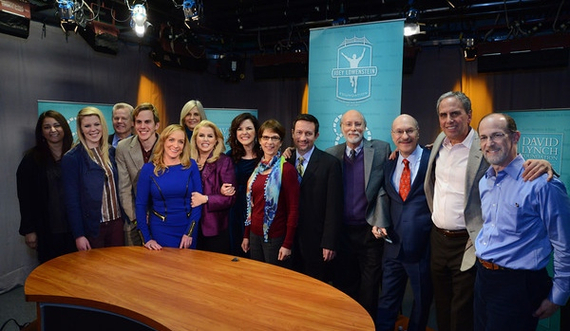
Many professionals came together for the webinar. Photo: Neshan Naitchayan.
During the webinar, Norman Rosenthal, M.D. and David Black, M.D. addressed the impact of Transcendental Meditation on stress, anxiety and health and its impact on autism.
Dr. Rosenthal is Clinical Professor of Psychiatry at Georgetown University School of Medicine. He is the psychiatrist who first described seasonal affective disorder (SAD) and pioneered the use of light therapy, which has helped millions of people around the world. He is an expert on the medical benefits of Transcendental Meditation, the author of over 200 scholarly articles and the best-selling author of eight popular books, including Transcendence, and most recently, The Gift of Adversity.
Norman stated "Transcendental meditation can reduce blood pressure, anxiety, the fight or flight response, and is a legitimate treatment for hypertension. With Autism Spectrum Disorders symptoms of anxiety are diminished with the regular practice of TM. With a decrease in anxiety there is less chance of tantrums, emotional regulation is improved and leads to the individual's ability adapt to new things - foods, people, changes in schedule, etc."
Dr. Black is a pediatric neuropsychologist and scientist nationally-recognized as an expert in autism spectrum and related disorders. He has spent much of the last ten years working clinically with children, adolescents, and adults with autism spectrum disorders. David is a researcher in the Pediatrics and Developmental Neuroscience Branch at the National Institute of Mental Health, NIH where he has been investigating the factors that contribute to the best outcomes among children and adolescents with autism spectrum disorders.
Dr. Black said something that truly resonated with me: "All medications have side effects as opposed to Transcendental Meditation which has no side effects." Medications can be so helpful, but often time the side-effects can be so harmful.
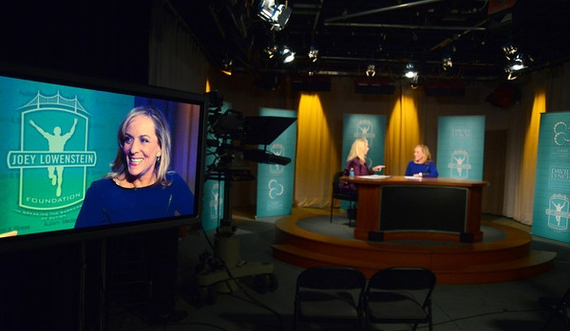
Broadcaster and moderator Rita Cosby chats with Roberta Lowenstein.
Photo: Neshan Naitchayan.
Roberta Lowenstein is the mother of the extraordinary young man with autism mentioned above, 17-year-old Joey Lowenstein. She is also the Founder and Chair of the Joey Lowenstein Foundation, a nonprofit which focuses on Athletics, Nutrition, Self-Development, RPM (RapidPromptingMethod), and Seizure and Brain Research. In addition, she now serves as a Global Adviser to our own foundation.
Roberta and Joey are both heroes to me. Diagnosed with autism at the age of two, Joey has endured much over the years - as has his mother. The most inspiring of which was Joey's recent conquering of a 14-year virtual silence. Unable to communicate through typical speech, or so was thought, Joey had uttered few words through the age of fourteen. In 2011, Roberta discovered a method of communicating called Rapid Prompting Method (RPM). RPM is an educational platform that utilizes a letter board to facilitate education and communication. Having tried dozens of therapies over the years nothing could have prepared Roberta for what was coming.
Thoughts are spelled out by Joey on his letter board, and are verbally spoken by Matthew, Joey's Teacher and Mentor.
I wrote after first meeting Joey that any attempt to accurately express the significance of what had transpired is futile -- Joey's mother put it best when she said, "it was like a miracle." It has been in moments such as these that I have been reminded of the few forces in the world greater than a mother's unconditional love. I know that from my own experience.
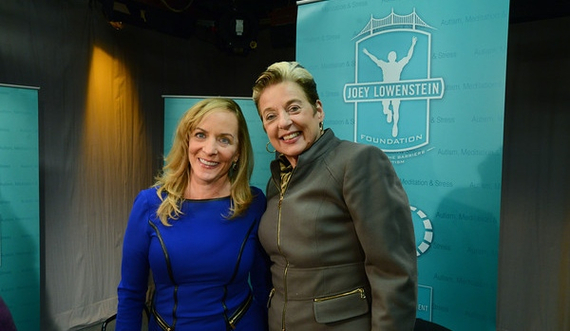
Roberta Lowenstein pauses with Ann Paton. Photo: Neshan Naitchayan.
After interviewing Joey the first time, while saying our 'goodbyes,' Joey -- with swift, sword-like determination of pen upon letter board, caught me off guard. Joey spelled out to me, "Jim, please write about how smart I am and that I am studying to pass my GED." The kid has spunk.
Roberta explained to me that her relationship with Joey has improved greatly since they both began to practice TM. Soon after he began practicing, Joey started his own blog Earnest to Learn . Soon after Joey told his mother that he wanted to start a foundation to help others like him to find their voice and maximize their potential, and the Joey Lowenstein Foundation was born. Joey does not want to be limited by his disorder and wants others to know they can "Break the Barriers of Autism" too.
The next speaker at the webinar was Dr. William Stixrud, an eminent clinical neuro-psychologist and an expert in the assessment of children and adolescents with learning, social, and emotional disorders. He has authored book chapters and articles on the adolescent brain, the effects of stress on learning and emotional development, and the benefits of TM for students with Attention Deficit Hyperactivity Disorder (ADHD). Bill is a member of the Adjunct Faculty at the Children's National Medical Center, as well as Assistant Professor of Psychiatry, Behavioral Sciences, and Pediatrics at George Washington University School of Medicine.
Dr. Stixrud stated, "The benefits of TM were dramatic among autistic individuals since their experience of the world is intense. Autistic individuals are wired for stress and anxiety. These individuals do not feel safe and often out of control. When they practice TM they find a safe "address" within themselves."

Michelle Zimmerman, Jaxson Zimmerman, Martha Simons, Roberta Lowenstein, Rita Cosby,
Lorraine Cancro,M.S.W., Sarina Grosswald, Ed.D., David Black, and William Stixrud, Ph.D.
Photo: Neshan Naitchayan.
I am a big fan of Dr. Sarina Grosswald and have edited her work in The Daily Kos . Sarina is an expert in cognitive learning, focusing on improving stress-related disorders. Her first-of-its-kind research on the effects of TM on children with ADHD and Autism spectrum, received global attention. She has published and lectured extensively in the fields of medicine and education.
Sarina stated during the webinar, "TM is great for the developing brain and the prefrontal cortex. TM increases mental flexibility and a willingness to interact with others which leads to a reduction in stress for individual and their family. It helps the autistic individual create a wider world. Two areas of impairment for autistic individuals is their ability to sleep and ability to socialize. These areas improve greatly while practicing TM."
In the words of Luce Leader 2014 Joey Lowenstein, "TM helps you find tranquility within. Stay cool and you can take the heat." I truly chuckled when I heard him say, "TM calms the mind and the mom!"
If you are interested in learning more about Transcendental Meditation and how it can be used to help you or a family member - or your clients - with Autism Spectrum Disorder, write autism@davidlynchfoundation.org. For more information on the Joey Lowenstein Foundation go to www.joeylowensteinfoundation.org .
from Healthy Living - The Huffington Post http://www.huffingtonpost.com/jim-luce/autism-conference-in-wash_b_4317127.html?utm_hp_ref=healthy-living&ir=Healthy+Living
via IFTTT

Photo: Neshan Naitchayan.
As my friend stress expert Lorraine Cancro, M.S.W. writes in The Stewardship Report :
Can a simple, easily-learned, evidence-based meditation technique be an effective tool for reducing the symptoms of Autism Spectrum Disorder (ASD)? A distinguished panel of experts came together for a groundbreaking webinar sponsored by the David Lynch Foundation, The Joey Lowenstein Foundation and the Center for Assessment and Treatment for Autism (CAAT). The experts discussed the research, clinical applications, and uses of Transcendental Meditation for reducing stress and stress-related disorders, improving brain function, and enhancing quality of life among children and teens with ASD.
I asked moderator Rita Cosby to explain to our readers why dealing with autism is so important. She told me:
The Centers for Disease Control and Prevention describe Autism Spectrum Disorders or 'ASDs,' as a group of developmental disabilities that can cause "significant social, communication and behavioral challenges." Today, Autism Spectrum Disorders are growing at epidemic rates -- affecting 1 in 88 individuals and 1 in 54 boys. Many people with ASDs suffer anxiety, sleep disturbances, poor self-regulation, and sensory sensitivities, all of which "significantly" impair daily functioning and quality of life.
In Washington, representatives of the David Lynch Foundation, the Joey Lowenstein Foundation, and the Center for Assessment and Treatment for Autism (CAAT) discussed the effects of a simple, evidence-based meditation technique that has grown since the 1960's: Transcendental Meditation - TM. Fast forward to the 2010's and TM is now practiced by more than five million people worldwide. And now, people with autism and their family members are vouching that it is capable of improving the symptoms in the treatment of Autism Spectrum Disorder.

and Sarina Grosswald, Ed.D. Photo: Neshan Naitchayan.
Lorraine explained, "People with ASDs frequently struggle with transition and changes in routine, and find social interactions stressful. Friendships tend to be challenging. Individuals with ASD commonly struggle to perceive social cues, interpret the social intentions of others, recognize the impact of their own actions in social situations, and respond in socially conventional ways. Reducing stress and anxiety has the potential to significantly improve the quality of life of people with ASDs and their families. However, current treatment for anxiety and stress is very limited."
Transcendental Meditation, they explained in Washington, is a simple, effortless technique practiced for just 15 to 20 minutes twice a day. It is, of course, practiced by sitting comfortably with ones eyes closed. As David Lynch Foundation director Bob Roth explained, "people of all ages and backgrounds -- including those with ASD -- are able to learn and practice TM. Having talked with Buddhists in Indonesia, Sri Lanka, India, Europe and North America, this resonates with everything I have learned.
The reasons for this seem obvious even to a non-meditating non-physician. During TM sessions, the individual experiences a unique state of deep rest and heightened alertness, which reduces stress and promotes more coherent brain functioning. TM as an option is important because there are so few options to treat ASD.

During the webinar, Norman Rosenthal, M.D. and David Black, M.D. addressed the impact of Transcendental Meditation on stress, anxiety and health and its impact on autism.
Dr. Rosenthal is Clinical Professor of Psychiatry at Georgetown University School of Medicine. He is the psychiatrist who first described seasonal affective disorder (SAD) and pioneered the use of light therapy, which has helped millions of people around the world. He is an expert on the medical benefits of Transcendental Meditation, the author of over 200 scholarly articles and the best-selling author of eight popular books, including Transcendence, and most recently, The Gift of Adversity.
Norman stated "Transcendental meditation can reduce blood pressure, anxiety, the fight or flight response, and is a legitimate treatment for hypertension. With Autism Spectrum Disorders symptoms of anxiety are diminished with the regular practice of TM. With a decrease in anxiety there is less chance of tantrums, emotional regulation is improved and leads to the individual's ability adapt to new things - foods, people, changes in schedule, etc."
Dr. Black is a pediatric neuropsychologist and scientist nationally-recognized as an expert in autism spectrum and related disorders. He has spent much of the last ten years working clinically with children, adolescents, and adults with autism spectrum disorders. David is a researcher in the Pediatrics and Developmental Neuroscience Branch at the National Institute of Mental Health, NIH where he has been investigating the factors that contribute to the best outcomes among children and adolescents with autism spectrum disorders.
Dr. Black said something that truly resonated with me: "All medications have side effects as opposed to Transcendental Meditation which has no side effects." Medications can be so helpful, but often time the side-effects can be so harmful.

Photo: Neshan Naitchayan.
Roberta Lowenstein is the mother of the extraordinary young man with autism mentioned above, 17-year-old Joey Lowenstein. She is also the Founder and Chair of the Joey Lowenstein Foundation, a nonprofit which focuses on Athletics, Nutrition, Self-Development, RPM (RapidPromptingMethod), and Seizure and Brain Research. In addition, she now serves as a Global Adviser to our own foundation.
Roberta and Joey are both heroes to me. Diagnosed with autism at the age of two, Joey has endured much over the years - as has his mother. The most inspiring of which was Joey's recent conquering of a 14-year virtual silence. Unable to communicate through typical speech, or so was thought, Joey had uttered few words through the age of fourteen. In 2011, Roberta discovered a method of communicating called Rapid Prompting Method (RPM). RPM is an educational platform that utilizes a letter board to facilitate education and communication. Having tried dozens of therapies over the years nothing could have prepared Roberta for what was coming.
Thoughts are spelled out by Joey on his letter board, and are verbally spoken by Matthew, Joey's Teacher and Mentor.
I wrote after first meeting Joey that any attempt to accurately express the significance of what had transpired is futile -- Joey's mother put it best when she said, "it was like a miracle." It has been in moments such as these that I have been reminded of the few forces in the world greater than a mother's unconditional love. I know that from my own experience.

After interviewing Joey the first time, while saying our 'goodbyes,' Joey -- with swift, sword-like determination of pen upon letter board, caught me off guard. Joey spelled out to me, "Jim, please write about how smart I am and that I am studying to pass my GED." The kid has spunk.
Roberta explained to me that her relationship with Joey has improved greatly since they both began to practice TM. Soon after he began practicing, Joey started his own blog Earnest to Learn . Soon after Joey told his mother that he wanted to start a foundation to help others like him to find their voice and maximize their potential, and the Joey Lowenstein Foundation was born. Joey does not want to be limited by his disorder and wants others to know they can "Break the Barriers of Autism" too.
The next speaker at the webinar was Dr. William Stixrud, an eminent clinical neuro-psychologist and an expert in the assessment of children and adolescents with learning, social, and emotional disorders. He has authored book chapters and articles on the adolescent brain, the effects of stress on learning and emotional development, and the benefits of TM for students with Attention Deficit Hyperactivity Disorder (ADHD). Bill is a member of the Adjunct Faculty at the Children's National Medical Center, as well as Assistant Professor of Psychiatry, Behavioral Sciences, and Pediatrics at George Washington University School of Medicine.
Dr. Stixrud stated, "The benefits of TM were dramatic among autistic individuals since their experience of the world is intense. Autistic individuals are wired for stress and anxiety. These individuals do not feel safe and often out of control. When they practice TM they find a safe "address" within themselves."

Lorraine Cancro,M.S.W., Sarina Grosswald, Ed.D., David Black, and William Stixrud, Ph.D.
Photo: Neshan Naitchayan.
I am a big fan of Dr. Sarina Grosswald and have edited her work in The Daily Kos . Sarina is an expert in cognitive learning, focusing on improving stress-related disorders. Her first-of-its-kind research on the effects of TM on children with ADHD and Autism spectrum, received global attention. She has published and lectured extensively in the fields of medicine and education.
Sarina stated during the webinar, "TM is great for the developing brain and the prefrontal cortex. TM increases mental flexibility and a willingness to interact with others which leads to a reduction in stress for individual and their family. It helps the autistic individual create a wider world. Two areas of impairment for autistic individuals is their ability to sleep and ability to socialize. These areas improve greatly while practicing TM."
In the words of Luce Leader 2014 Joey Lowenstein, "TM helps you find tranquility within. Stay cool and you can take the heat." I truly chuckled when I heard him say, "TM calms the mind and the mom!"
If you are interested in learning more about Transcendental Meditation and how it can be used to help you or a family member - or your clients - with Autism Spectrum Disorder, write autism@davidlynchfoundation.org. For more information on the Joey Lowenstein Foundation go to www.joeylowensteinfoundation.org .
See Stories by Jim Luce on:
Children | Education | Health
The James Jay Dudley Luce Foundation (www.lucefoundation.org) supporting young global leadership is affiliated with Orphans International Worldwide (OIWW), raising global citizens. If supporting youth is important to you, subscribe to J. Luce Foundation updates here.
Follow Jim Luce on Facebook, Tumblr, Twitter, and LinkedIn.
from Healthy Living - The Huffington Post http://www.huffingtonpost.com/jim-luce/autism-conference-in-wash_b_4317127.html?utm_hp_ref=healthy-living&ir=Healthy+Living
via IFTTT
This comment has been removed by the author.
ReplyDeletenice blog..http://phen375loss.co.uk/
ReplyDelete